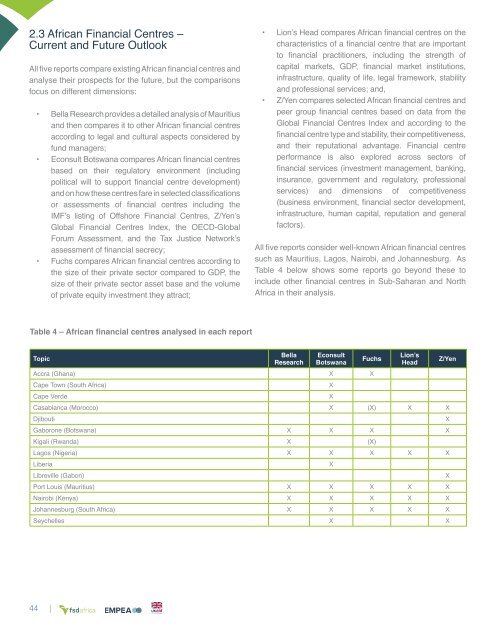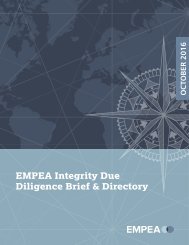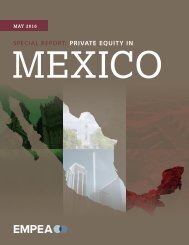You also want an ePaper? Increase the reach of your titles
YUMPU automatically turns print PDFs into web optimized ePapers that Google loves.
2.3 African Financial Centres –<br />
Current and Future Outlook<br />
All five reports compare existing African financial centres and<br />
analyse their prospects for the future, but the comparisons<br />
focus on different dimensions:<br />
• Bella Research provides a detailed analysis <strong>of</strong> Mauritius<br />
and then compares it to other African financial centres<br />
according to legal and cultural aspects considered by<br />
fund managers;<br />
• Econsult Botswana compares African financial centres<br />
based on their regulatory environment (including<br />
political will to support financial centre development)<br />
and on how these centres fare in selected classifications<br />
or assessments <strong>of</strong> financial centres including the<br />
IMF’s listing <strong>of</strong> Offshore Financial Centres, Z/Yen’s<br />
Global Financial Centres Index, the OECD-Global<br />
Forum Assessment, and the Tax Justice Network’s<br />
assessment <strong>of</strong> financial secrecy;<br />
• Fuchs compares African financial centres according to<br />
the size <strong>of</strong> their private sector compared to GDP, the<br />
size <strong>of</strong> their private sector asset base and the volume<br />
<strong>of</strong> private equity investment they attract;<br />
• Lion’s Head compares African financial centres on the<br />
characteristics <strong>of</strong> a financial centre that are important<br />
to financial practitioners, including the strength <strong>of</strong><br />
capital markets, GDP, financial market institutions,<br />
infrastructure, quality <strong>of</strong> life, legal framework, stability<br />
and pr<strong>of</strong>essional services; and,<br />
• Z/Yen compares selected African financial centres and<br />
peer group financial centres based on data from the<br />
Global Financial Centres Index and according to the<br />
financial centre type and stability, their competitiveness,<br />
and their reputational advantage. Financial centre<br />
performance is also explored across sectors <strong>of</strong><br />
financial services (investment management, banking,<br />
insurance, government and regulatory, pr<strong>of</strong>essional<br />
services) and dimensions <strong>of</strong> competitiveness<br />
(business environment, financial sector development,<br />
infrastructure, human capital, reputation and general<br />
factors).<br />
All five reports consider well-known African financial centres<br />
such as Mauritius, Lagos, Nairobi, and Johannesburg. As<br />
Table 4 below shows some reports go beyond these to<br />
include other financial centres in Sub-Saharan and North<br />
Africa in their analysis.<br />
Table 4 – African financial centres analysed in each report<br />
Topic<br />
Bella<br />
Research<br />
Econsult<br />
Botswana<br />
Accra (Ghana) X X<br />
Cape Town (South Africa)<br />
X<br />
Cape Verde<br />
X<br />
Casablanca (Morocco) X (X) X X<br />
Djibouti<br />
X<br />
Gaborone (Botswana) X X X X<br />
Kigali (Rwanda) X (X)<br />
Lagos (Nigeria) X X X X X<br />
Liberia<br />
X<br />
Libreville (Gabon)<br />
X<br />
Port Louis (Mauritius) X X X X X<br />
Nairobi (Kenya) X X X X X<br />
Johannesburg (South Africa) X X X X X<br />
Seychelles X X<br />
Fuchs<br />
Lion’s<br />
Head<br />
Z/Yen<br />
44 |





